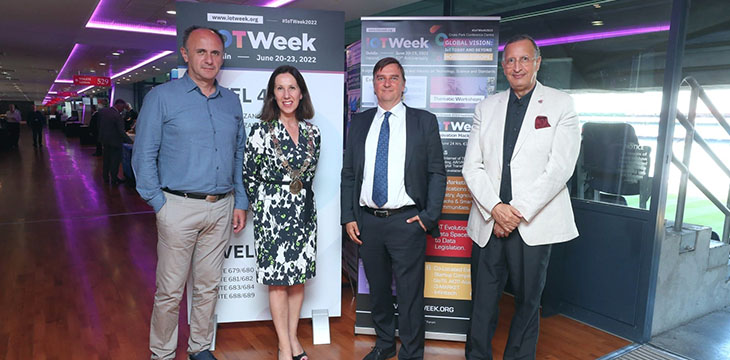
|
Getting your Trinity Audio player ready... |
On day two of the Global IoT Summit in Dublin, IPv6 Forum Founder and President Latif Ladid moderated a panel on blockchain and food supply. Joining him was Dr. Srdjan Krco to discuss his company DunavNET and how it’s working to bring greater transparency and accountability to food supply chains.
Latif Ladid outlines the critical problems
The panel begins with Ladid outlining the key problems current global food supply chains face. He highlights disease and contamination, waste product recalls, inefficiency and errors, inventory tracing and tracking, counterfeit products, visibility reporting, and enforcing compliance as major issues in food supply chains today.
Ladid tells us that these problems will worsen as the demand for food doubles by 2050. He highlights how deforestation, slave labor in the agricultural industry, and several other significant problems are set to worsen in the coming decades.
If you’re familiar with how blockchain technology works, you’ve probably already guessed that it can play a major role in solving some of these issues. Indeed, Ladid estimates that it would take 5-10 years to fully integrate food supply chains with blockchain technology. Why so long? It’s because current blockchains still run on IPv4 and IPv6 is required for full end-to-end traceability.
Blockchain technology will be the next evolution of the internet – Latif Ladid
Ladid tells us how the Internet of Things, which will allow the tracing and tracking to solve these issues, has already been through three generations. The first two depended on IPv4, but the third generation of IoT will use IPv6 and would enable direct two-way communication.
As we’ve learned elsewhere in the conference, there’s only one public blockchain that was designed from the outset to be IPv6 compatible: Bitcoin SV. Although Ladid doesn’t mention that directly in his presentation, he has said elsewhere that BSV is the missing piece that makes the grand vision of the IoT possible.
What do the early projects designed to solve these problems look like?
Before introducing Dr. Srdjan Krco, Ladid tells us about Cities2030. This pilot project uses blockchain technology to trace the delivery of goods through the entire supply chain. The end result is that by using a simple QR code, the customer can view a full record of the product’s history from where it was grown to the shelf. This is the sort of world transparent blockchains like BSV make possible.
Ladid then introduces Dr. Srdjan Krco. He tells us about his company DunavNET and its Demeter project. It’s focused on the agricultural sector and aims to help achieve the European Green Deal objectives, such as reducing pesticides, enhancing organic farming, and other objectives related to sustainability.
To make all of this possible, Demeter uses smart sensors on farms to collect data on everything from chicken weights to temperatures and sunlight. Having this data allows farmers to measure everything more effectively, unlocking new efficiencies and more sustainable ways of doing things. Dr. Krco envisions all of this data sitting on top of a “blockchain layer,” allowing for unprecedented levels of information sharing in a searchable knowledge graph.
In a video presentation, Dan Jones of Baanx Group again highlights the need for greater transparency. He tells us that in the coffee business he’s part of, customers insist on total traceability and are aware that they are being “greenwashed” by some companies. Jones, too, believes that blockchain technology enables the solutions needed to give customers the information they desire.
Analysis: All of this will depend on a scalable public blockchain
What’s clear from these various related presentations is that data collection and transparency will be key trends in food supply chains and many other industries in the future. It’s apparent that blockchain technology will play a crucial role in all of this, but it’s not entirely clear if the need for one scalable public blockchain to underpin all of it is fully understood by the majority of those creating solutions.
While leaders in their respective fields understand the sport of transparency blockchain technology can bring about, it seems that many are still using private blockchains, which essentially defeats the purpose. Walled gardens will not allow for the sort of data sharing they strive for, and private blockchains are, in the end, not much better than spreadsheets. What is needed is a public, immutable blockchain like BSV that allows for privacy while making data accessible to all. The immutable nature of such a blockchain makes it so that nobody can alter records or falsify data related to supply chains.
This understanding will take time to sink in. For now, it’s highly encouraging to see that most people in the supply chain industry understand that blockchain is the key component to all of this. It shouldn’t take long before, via a combination of experimentation and research, they discover that one scalable global blockchain that’s entirely IPv6 compatible delivers all of the benefits they’re seeking and more. Thankfully, companies like UNISOT are already working on solutions that utilize the BSV blockchain.
Watch: The BSV Global Blockchain Convention presentation, Food Supply Chain & Blockchain
https://www.youtube.com/watch?v=RzJsCRb6zt8&t=22228s
Recommended for you
Lorem ipsum odor amet, consectetuer adipiscing elit. Elit torquent maximus natoque viverra cursus maximus felis. Auctor commodo aliquet himenaeos fermentum
Lorem ipsum odor amet, consectetuer adipiscing elit. Accumsan mi at at semper libero pretium justo. Dictum parturient conubia turpis interdum

 11-21-2024
11-21-2024


